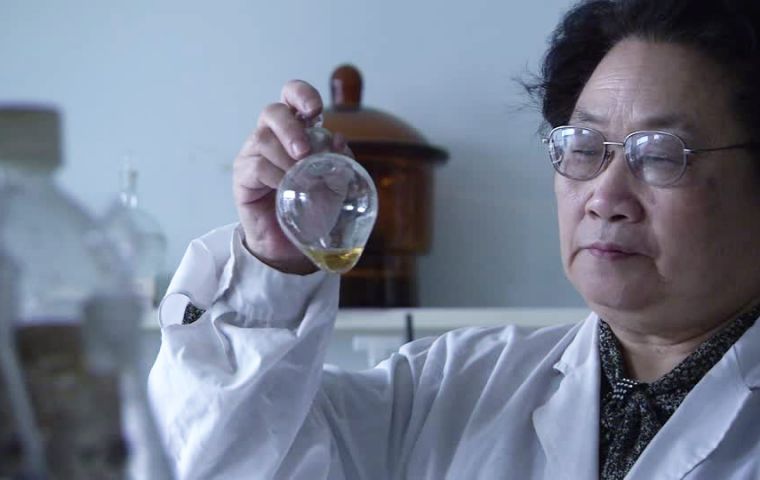MercoPress. South Atlantic News Agency
Nobel in medicine for creating natural drugs to combat parasites; China's first prize
 Inspired by traditional Chinese medicine, Tu discovered that a compound from the wormwood plant was highly effective against the malaria parasite
Inspired by traditional Chinese medicine, Tu discovered that a compound from the wormwood plant was highly effective against the malaria parasite  Omura and Campbell (L) created the drug avermectin, whose derivatives have nearly rid the planet of river blindness and lymphatic filarisis
Omura and Campbell (L) created the drug avermectin, whose derivatives have nearly rid the planet of river blindness and lymphatic filarisis Nobel prize in medicine went Monday to three scientists hailed as “heroes in the truest sense of the word” for saving millions of lives with the creation of the world's leading malaria-fighting drug and another that has nearly wiped out two devastating tropical diseases.
Tu Youyou — the first-ever Chinese medicine laureate — turned to ancient texts to produce artemesinin, a drug that is now the top treatment for malaria. Inspired by traditional Chinese medicine, Tu discovered that a compound from the wormwood plant was highly effective against the malaria parasite, while working on a project for the Chinese military during the Cultural Revolution.
She will share the 8 million Swedish kronor (about $960,000) award with Japanese microbiologist Satoshi Omura and William Campbell, an Irish-born U.S. scientist.
Omura and Campbell created the drug avermectin, whose derivatives have nearly rid the planet of river blindness and lymphatic filarisis, diseases caused by parasitic worms and spread by mosquitoes and flies. They affect millions of people in Africa, Latin America and Asia, leaving sufferers blind or disfigured and unable to work.
The Nobel committee said the winners, who are all in their 80s and made their breakthroughs in the 1970s and '80s, had given humankind powerful tools: “The consequences in terms of improved human health and reduced suffering are immeasurable,” the committee said.
Campbell, 85, is a research fellow emeritus at Drew University in Madison, New Jersey. He said he made his main discovery in 1975 while working at pharmaceutical company Merck. “It was a great team effort,” said Campbell, who now lives in North Andover, Massachusetts. He said the award came as a “huge surprise.”
Omura, 80, is a professor emeritus at Kitasato University in Japan and is from the central prefecture of Yamanashi. He wondered whether he deserved the prize.
“I have learned so much from microorganisms and I have depended on them, so I would much rather give the prize to microorganisms,” Omura told Japanese broadcaster NHK.
Working in the 1970s, Omura isolated new strains of Streptomyces bacteria and cultured them so that they could be analyzed for their impact against harmful microorganisms, the Nobel committee said.
Omura said the crucial strain was found in a soil sample from a golf course near Tokyo. He said he always carries around a plastic bag in his wallet so he can collect soil samples.
Campbell showed that one of those cultures was remarkably efficient against parasites in animals, the committee said. The bioactive agent was purified, named avermectin and modified to a compound that effectively killed parasitic larvae, leading to the creation of a new class of drugs.
Today, its derivative ivermectin is considered a highly effective preventive treatment against river blindness and lymphatic filariasis, the committee said.
Tu, 84, is a researcher at the China Academy of Chinese Medical Sciences. As a junior researcher, she was recruited by Chairman Mao's government to work on a military project in 1969 to find malaria drugs.
She turned to herbal medicine to discover a new malarial agent in an extract from the sweet wormwood plant. The agent, artemisinin (pronounced ar-tuh-MIHS'-ihn-ihn), was highly effective against malaria, a disease that was on the rise in the 1960s, the committee said.
Malaria is a mosquito-borne disease that still kills around 500,000 people a year, mostly in Africa, despite efforts to control it.
“This is indeed a glorious moment,” said Li Chenjian, a vice provost at prestigious Peking University. “This also is an acknowledgement to the traditional Chinese medicine, for the work began with herbal medicine.”




Top Comments
Disclaimer & comment rules-

Read all commentsdrugs to combat parasites;
Oct 06th, 2015 - 11:03 am 0CFK being the first....lol
Commenting for this story is now closed.
If you have a Facebook account, become a fan and comment on our Facebook Page!